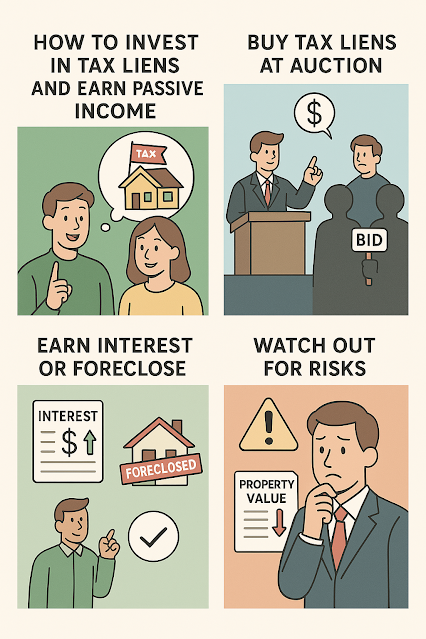How to Invest in Tax Liens and Earn Passive Income
Looking for a way to earn passive income with relatively low upfront costs?
Investing in tax liens might be the hidden gem you’ve never considered.
In 2025, more real estate investors are diving into this strategy as a means to generate steady returns without buying entire properties.
Table of Contents
- What Is a Tax Lien?
- How Tax Lien Investing Works
- Benefits and Risks
- How to Start Investing in Tax Liens
- Top Tax Lien Investing Platforms
- Final Thoughts
What Is a Tax Lien?
A tax lien is a legal claim against a property by the government when the owner fails to pay property taxes.
Counties need their tax revenue, so they auction off these liens to investors.
If you purchase a lien, the property owner must repay you the tax amount—plus interest.
How Tax Lien Investing Works
You attend (or register for) a county tax lien auction—either online or in person.
You bid on liens and, if successful, pay the outstanding tax amount to the county.
The property owner has a redemption period, usually 1–3 years, to repay the debt plus interest.
If they don't, you may have the legal right to foreclose and acquire the property.
Benefits and Risks
Benefits
✔️ High interest rates: Returns vary by state, often ranging from 8% to 36% annually.
✔️ Potential property ownership: If the lien isn't repaid, you may acquire the property at a discount.
✔️ Low initial investment: Many liens can be bought for under $1,000.
Risks
⚠️ No guarantees: The property owner might never redeem the lien, or the property might be worthless.
⚠️ Complex legal process: Foreclosure is often complicated and varies by jurisdiction.
⚠️ Hidden costs: You might end up responsible for other unpaid liens or expenses.
How to Start Investing in Tax Liens
1. Learn the Rules in Your State
Not every state allows tax lien sales.
Some offer tax deeds instead (actual ownership), so do your homework via local county websites.
2. Register for Auctions
Find your local county’s tax lien auction site or schedule.
Some counties require deposits or registration ahead of time.
3. Do Property Due Diligence
Research the property behind the lien—location, market value, any environmental hazards, or legal issues.
4. Start Small
Begin with a few liens under $1,000 and track their outcomes to learn the ropes before scaling up.
Top Tax Lien Investing Platforms
1. Bid4Assets
Offers tax lien and deed auctions from counties across the U.S., especially in Maryland and Florida.
2. GovEase
Online platform for tax lien and deed auctions in states like Alabama and Mississippi.
3. RealAuction
Used by several counties for online tax lien sales.
Florida and Ohio counties often use this platform.
Final Thoughts
Tax lien investing offers a unique route to passive income if done correctly.
It’s not without its challenges, but with careful research and a conservative strategy, it can yield impressive results.
In 2025, tax liens remain an under-the-radar opportunity for smart investors.
Keywords: Tax Lien Investing, Passive Income, Real Estate Investing, Tax Lien Auctions, 2025 Financial Strategy

